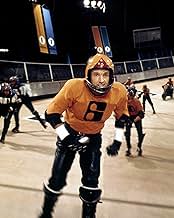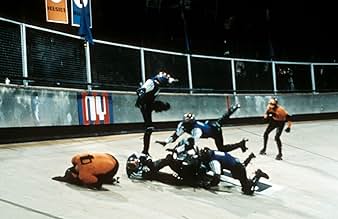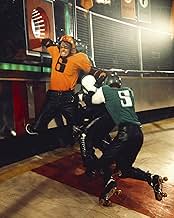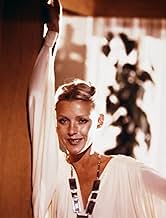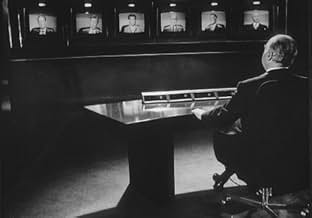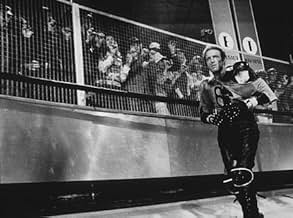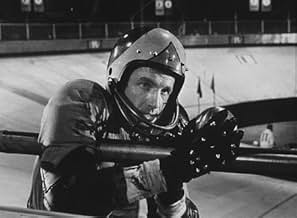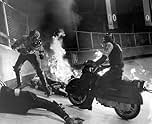In a corporate-controlled future, an ultra-violent sport known as Rollerball represents the world, and one of its powerful athletes is out to defy those who want him out of the game.In a corporate-controlled future, an ultra-violent sport known as Rollerball represents the world, and one of its powerful athletes is out to defy those who want him out of the game.In a corporate-controlled future, an ultra-violent sport known as Rollerball represents the world, and one of its powerful athletes is out to defy those who want him out of the game.
- Won 1 BAFTA Award
- 4 wins & 5 nominations total
- Bartholomew's Aide
- (as Rick Le Parmentier)
- Madrid Biker #1
- (uncredited)
- Houston Team Rookie
- (uncredited)
- Biker
- (uncredited)
Featured reviews
Now, having just watched the movie twice in a night, the second time with the director's commentary, I have finally got to grips with the scenes between the action, and discovered that I like it more than ever. The view of the future is not highly original; tipping its hat to the stratified societies foreseen by Orwell and Huxley, amongst others; but nevertheless the portrayal is engaging. Jewison astutely realised that only by filling in the image of the future society, the characters, and the political background against which the tournament unfolds, would the game be seen as truly REAL for the characters. In the meanwhile, he also has the chance to build suspense, upping the stakes for both the heroic gladiator/combateur Jonathon, and his would-be puppet master Bartholemew. In this way, when we come to watch the actual contests, our enthusiasm is whetted, and by making the rules progressively more dangerous with each passing game, the stakes grow ever higher.
The central themes of the movie are (i) loss-of-soul/nihilism/sensual-vs-spiritual-happiness, and (ii) individuality vs state control. Perhaps the best scenes elucidating these themes are the famous `tree killing' scene, and the conversation between Jonathon and Ella in the forest. The use of imagery and metaphor is widespread; I will mention only the terrific concept of the roulette wheel as game arena, with the players INSIDE, instead of outside; and the Circus Maximus parallel. You may draw many interesting conclusions from this about the director's and writer's intent.
My final word is: watch it once, soak up the action, and be bored by the rest. Then view it again, feel yourself in Jonathon's dilemma, experience his wrenching disappointment with the people in his life who betray him, and try to tear yourself away if you can as he is pushed inexorably to his fate in the arena of ROLLERBALL.
On one level, I believe this is the best sports movie ever made. It is miles ahead of more "realistic" films like NORTH DALLAS FORTY or SEMI TOUGH or even critical favorites like COBB and EIGHT MEN OUT. The very fact that Rollerball is a make believe sport adds believability to the action sequences. Watch a baseball film and you can see at a glance that Robert Redford or Kevin Costner are not real athletes. But since rollerball has never been played, James Caan as Jonathan E really looks like the best in the game. There are no "clichés" like home runs or long passes to spoil the danger and excitement -- every crash and goal is new, never having been seen before. And there are no clichés about the fans, the athletes, or "win one for the Gipper" or gamblers or shady ladies trying to make Our Hero throw the game. From the beginning we sense the stakes are higher -- Jonathan E will either conform or die.
That brings up the fact that ROLLERBALL also shares a central theme with a lot of other powerful movies, like FROM HERE TO ETERNITY, COOL HAND Luke, and even A MAN FOR ALL SEASONS. What happens when a uniquely gifted individual refuses to participate in a corrupt system? This movie is so powerful as a drama you hardly notice the sci fi trappings. The rugged action scenes are so real you hardly notice that rollerball is a make believe game.
James Caan as Jonathan E turns in a sensitive, nuanced performance, deliberately underplaying the tough guy side as much as possible. Michael Beck as Moonpie is the foolishly overconfident one, playing Frank Sinatra's Maggio to Caan's Robert E. Lee Pruitt. But unlike the hard luck privates in this man's army, these rollerball stars get to have glamor, luxury, and unlimited sex between vicious games of rollerball. The movie captures so much sensuality and glamor that you can see why men risk death game after game to be known as "great rollerballers who bash in faces." This movie is spectacular -- an action classic with brains!
I had some vague notion of the storyline, but I tried not to read the case or liner notes and take in the movie on a first impression. Released in the summer of 1975, there are definite and readily apparent influences of earlier films, not the least of which being Stanley Kubrick's "A Clockwork Orange." The colors, the film stock, the editing style are all reminiscent of that earlier, similarly-themed master work, yet I don't believe it detracted from this film at all.
Supposedly set in the year 2018 (though this is never established in the movie, that I could tell), corporations have replaced governments and managed to eliminate war, poverty, disease and bad hair days. People don't have too much of a say in what goes on around them, but they're all very physically comfortable. Of course, the violent nature of the human beast must be satisfied, and it is -- in the gladitorial ring of the world's most popular sport, Rollerball. The game consists of two teams (from cities all over the world) skating and motorbiking around a 1/8-mile track, trying to get a steel ball into a goal. As the course of the season progresses, more and more limitations as to what constitutes fair play are removed, and by the final, the melee is total.
James Caan plays the Michael Jordan, Wayne Gretzky and Joe Montana of Rollerball, Jonathan E.. He's the biggest star in the world, but he's also a thinking man, and when the corporation which owns his team wants him to retire, he refuses, wanting to know first why they'd want him to retire when he's playing at his best.
The rest I leave to the viewer to find out. I can only say it is a very well-crafted script with plenty to say about violence, the spirit of the individual man, and the bloodlusts that a happy and idle populace can muster. Very well-filmed with touches of brilliance in editing and framing.
A detraction which really couldn't be helped involves the portrayal of the future. Director Norman Jewison couldn't know what the world of forty years in his future would be like, so he took the wise route of not making it all that different from 1975, but with subtle changes (such as the interesting but impractical "multivision" concept in which all TV sets have a large screen and three smaller screens above it, each showing different but related pictures). The result, though infinitely preferable to lots of neon and superfluous antennae, is that the place looks like 1975 with slightly cooler gadgets. I can't tell you what 2018 will look like, but it won't look like that.
Interestingly, the "corporate inevitability" concept of the future, which I believe Jewison meant earnestly, plays out much more as a satire of the opposite, a communist world. Much of what the coroprate culture says, as personified by John Houseman's Mr. Bartholomew, sounds much like the rhetoric of communism -- people are fed and comfortable and happy, but the individual is beholden to the group at all costs. Indeed, some of the words of description of the culture seem lifted straight from Marx and Engels.
The DVD leaves something to be desired, though. The picture is a lot dirtier than I'd like, especially in still-shot scenes. The color is muted, though this may be part style, and some shots seem positively muddy.
The remastered 5.1 soundtrack is a disappointment. The rear speakers get very little play. One particular effect of note, I must concede, is one moment when you can hear the ball roll all the way around the arena, and it's as though you're standing in the center.
In all, it's an excellent movie, which I can't recommend enough, but if the disc had been any pricier than it was, I would have felt as though I was somewhat taken.
Perhaps after the release of the upcoming remake, there will be a better special edition.
My opinion of 'Rollerball' is that it is a flawed film but also a very impressive one. The momentum does sag, particularly in the middle, in some scenes not on the arena. Bogged down by a little too much extraneous talk, like the Ella story line, and a few ideas that could have gone into more depth. Of the characters, the only ones that are really developed like "real" characters are Jonathan E and Bartholomew (Ella particularly is a cipher), and parts while well intended are laid on too thick somewhat.
However, 'Rollerball' is well made visually. It's all very slick and stylish and the set for the rollerball arena still makes one go wow. Liked the look of the future dystopia, not extraordinary but it was atmospheric. Jewison directs with assurance, while the script has a lot of intelligent and thought-provoking lines and ideas that resonate a lot and still are very much relevant. The message is much appreciated and is very much pertinent.
Story is intriguing and has enough to compel, and Jonathan E and Bartholomew are very interesting characters. The supporting cast, particularly John Beck, are solid.
'Rollerball' excels particularly in four particularly strongly done areas. The tautly filmed and edited rollerball sequences are incredibly exciting and have a real sense of disturbing danger and nerve-shredding tension too. Andre Previn does well with the music score, but shining even more is to me some of the best use of classical music on film, including the most beautiful use of Albinoni's Adagio ('Manchester By the Sea' also used it beautifully but it's done more subtly here), Bach's Toccata used very creepily and the best use of Shostakovich on film. It's not just that the music itself is wonderful but also that they are so cleverly used, almost ironically and also unnervingly.
James Caan is a highly charismatic lead and gives the character nuances, while John Houseman's Bartholomew is chilling. One cannot review 'Rollerball' without mentioning the incredibly powerful ending either.
Overall, very impressive but flawed. 7/10 Bethany Cox
Did you know
- TriviaMany of the extras in the film received an additional wage in order to cut their fashionably long hair so the look of the film would not be tied to the era in which it was made.
- GoofsAt the beginning of the New York game, after many moments in the film where different characters have repeated that there would have been "no time limit", the scoreboard shows the countdown (starting from 20.00).
This is not actually a goof, as the game was still going to have 20-minute periods, but there was going to be no limit to the number of periods, hence "no time limit".
- Quotes
Bartholomew: Sweet dreams, Moonpie. That's a bad habit you've got there. You know what that habit will make you dream, Moonpie? You'll dream you're an executive. You'll have your hands on all the controls, and you will wear a gray suit, and you will make decisions. But you know what, Moonpie? You know what those executives dream about out there behind their desks? They dream they're great Rollerballers. They dream they're Jonathan; they have muscles, they bash in faces.
- ConnectionsFeatured in Brubaker (1980)
- SoundtracksToccata and Fugue in D minor, BWV 565
(uncredited)
Composed by Johann Sebastian Bach
Performed by Simon Preston and the London Symphony Orchestra
Conducted by André Previn
Details
- Release date
- Countries of origin
- Language
- Also known as
- Rollerball: los gladiadores del futuro
- Filming locations
- BMW Building, Munich, Bavaria, Germany(Energy Corporation headquarters)
- Production companies
- See more company credits at IMDbPro
Box office
- Budget
- $6,000,000 (estimated)
- Runtime
- 2h 5m(125 min)
- Color
- Sound mix
- Aspect ratio
- 1.75 : 1



